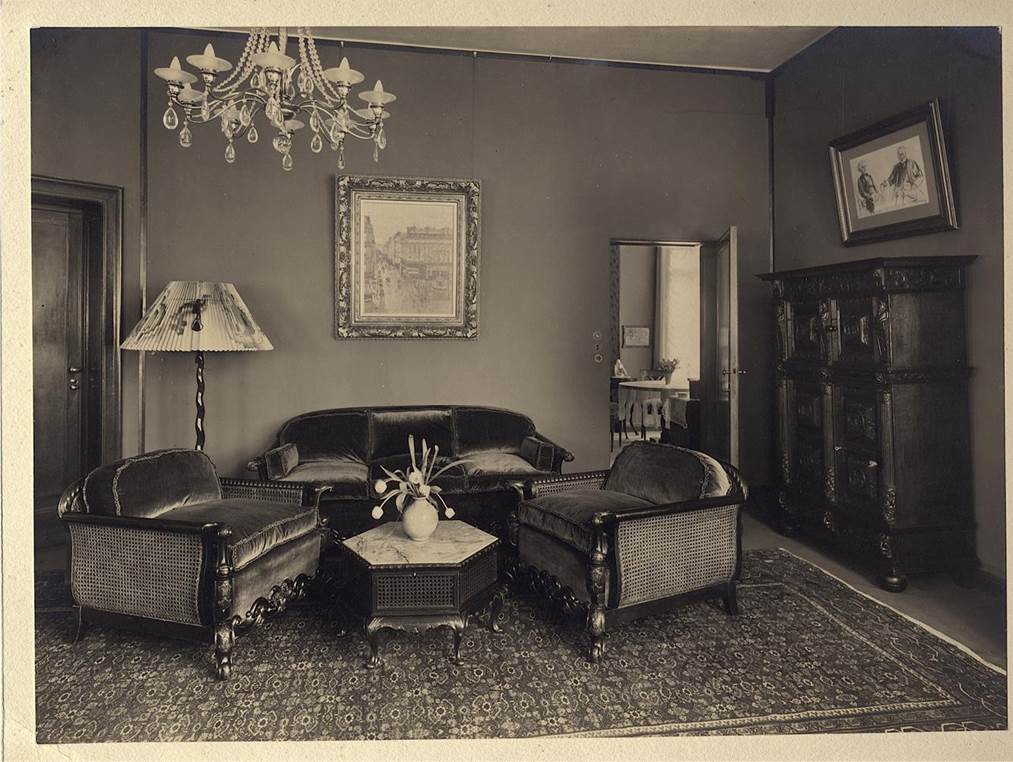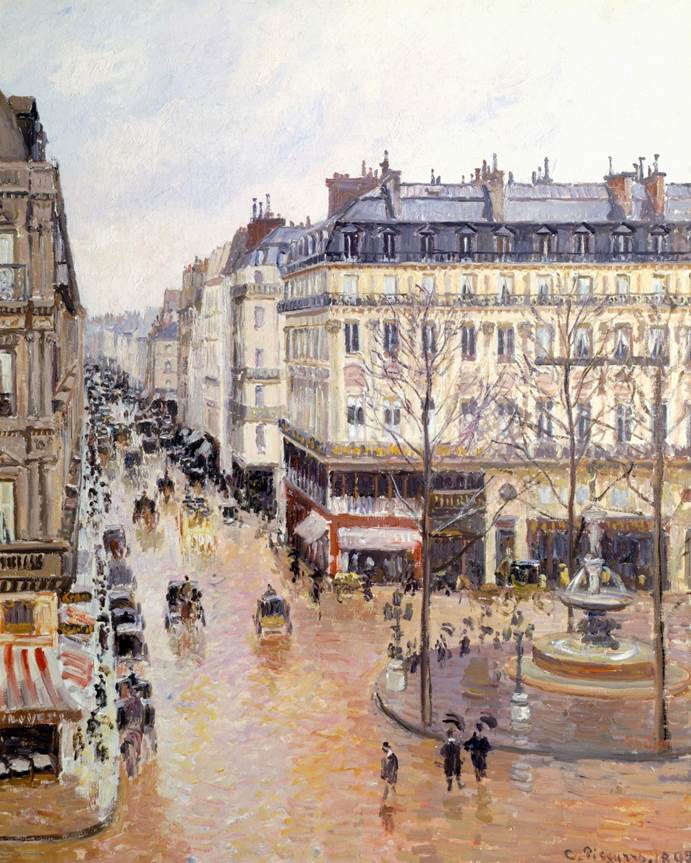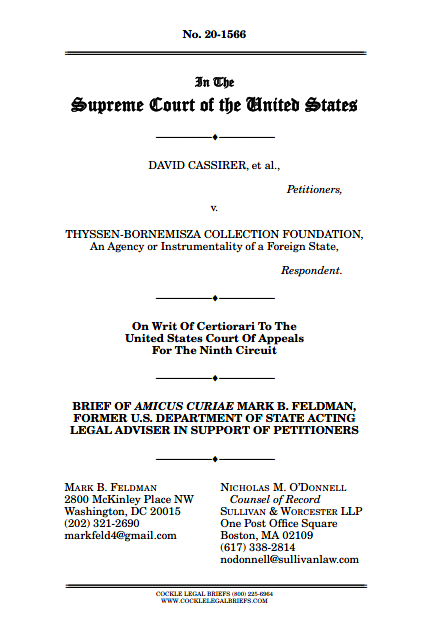
The U.S. Court of Appeals for the 9th Circuit ruled on January 9, 2024 that the Thyssen-Bornemisza Collection Foundation in Madrid is the owner of Rue Saint–Honoré, après-midi, effect de pluie (1892) by Camille Pissarro, a painting sold by German Jew Lilly Cassirer under Nazi duress. After the Cassirer family prevailed in the Supreme Court in 2023 that the 9th Circuit had previously applied the wrong legal test, the question before the 9th Circuit was the choice of which law to apply. In any case where the parties and subject matter are in different jurisdictions (or within overlapping jurisdictions like state and federal), a court must first decide which body of law to apply in analyzing a particular case. Here, the 9th Circuit ruled that Spanish law applied because Spanish law would be harmed more than California law if the other body of law applied (known as comparative impairment analysis). This, in turn, led to the holding that the Thyssen-Bornemisza Collection Foundation acquired good title after holding the painting for long enough that prior claims were extinguished.
The decision is thinly-reasoned. It looks to the “place of relevant conduct” as paramount to choosing applicable law, but concluded that the only relevant conduct was Spain’s purchase in 1993 of the Baron Hans Heinrich Thyssen-Bornemisza’s collection. Not the Baron’s Swiss residence, not his purchase of a stolen painting in New York (not located in Spain when last we checked) in 1976, not the earlier (New York) sale by Knoedler Gallery, nor the painting’s passage through California in the 1950s, nor the source of the defect in the first place: Nazi Germany. Rather, The court insultingly referred to Holocaust survivor and refugee Claude Cassirer’s life in California as a “fortuity.” As the late Justice Antonin Scalia might have said, “pure applesauce.”
The upshot is that a state (Spain, through the TBC) that did not acquire good title to a painting that was indisputably dispossessed by the Nazis will (barring further review) keep this ill-gotten property. Spain should have returned the painting the first time it was asked to do so. Digging its heels in over 18 years of litigation is a mockery of the commitments Spain made in the 1998 Washington Principles on Nazi-Confiscated Art. Nothing about Spanish law is impaired by refusing to honor a transaction at the direction of the Nazis.
The family has vowed to fight on, and good for them. As I often tell people as an example to frame this issue and this case, the picture below is of the painting in Lilly’s home. Now imagine that this was your home, and the very worst person you knew came in and demanded it because he knew you had no power to resist. Would you give up?
Read More
Topics:
Lilly Cassirer,
Rue Saint-Honoré après-midi effet de pluie,
Claude Cassirer,
Foreign Sovereign Immunities Act,
California,
Washington Principles on Nazi-Confiscated Art,
Spain,
FSIA,
Camille Pissarro,
Ninth Circuit Court of Appeals,
Cassirer v. Thyssen-Bornemisza Collection,
Jakob Scheidwimmer,
Sydney Schoenberg,
Eugen Kampf,
Antonin Scalia,
Hans W. Lange,
Federal Republic of Germany v. Philipp,
Philipp v. Stiftung Preussischer Kulturbesitz,
Simon v. Republic of Hungary,
choice of law,
Baron Thyssen-Bornemisza
Today I am pleased to announce that I have filed a brief in the Supreme Court of the United States as counsel of record for amicus curiae Mark B. Feldman, former U.S. Department of State Acting Legal Adviser. We filed the brief in the case of Cassirer et al. v. Thyssen-Bornemisza Collection Foundation (“TBC”). Cassirer is the long-running dispute over title to Rue St. Honoré, après-midi, effet de pluie (Rue St. Honoré, Afternoon, Rain Effect) by Impressionist painter Camille Pissarro. The painting once belonged to Lilly Cassirer, a Jewish woman in Berlin in 1939, from whom Nazi agents “bought” the painting. The case before the Supreme Court is not about whether the painting was stolen—it is undisputed that it was. Rather, the Supreme Court will review the Ninth Circuit’s decision that Spanish law, not California law, should govern the ownership rights.
Read More
Topics:
Lilly Cassirer,
Foreign Sovereign Immunities Act,
Supreme Court,
SPK,
Stiftung Preussischer Kulturbesitz,
Hermann Goering,
FSIA,
expropriation exception”,
sovereign immunity,
UNESCO,
Rue St. Honoré,
Camille Pissarro,
Baron Hans-Heinrich Thyssen- Bornemisza,
Cassirer v. Thyssen-Bornemisza Collection,
Welfenschatz,
Jakob Scheidwimmer,
Philipp v. F.R.G.,
Mark B. Feldman

We were privileged to file today a petition for certiorari with the Supreme Court of the United States on behalf of our client, art dealer Alexander Khochinsky. The petition asks the Court for reinstatement of a lawsuit against Poland for lack of subject matter jurisdiction (i.e., sovereign immunity) for Poland’s effort to have Khochinsky extradited from New York as leverage to force him to relinquish a painting that he inherited from his father. The case invokes three provisions of the Foreign Sovereign Immunities Act, 28 U.S.C. § 1605 (the FSIA): the implicit waiver exception, the counterclaim exception, and the non-commercial tort exception. The basis on which we seek the Court’s review is simple: if the holding below is the law, then no one is safe in the United States from any number of rogue regimes that abuse the extradition system for discriminatory and persecutory reasons. To allow this decision to stand is a threat to any American. What if, for example, Turkey pursued a Christian American in similar fashion motivated by religious animus about owning a particular kind of art from the Ottoman Empire? What if the Taliban, now the de facto government of Afghanistan, declared a worldwide intention to find Jews in possession of Pashto cultural property? What if China declared American intellectual property to be revolutionary patrimony?
Read More
Topics:
China,
Alexander Khochinsky,
Holocaust claims,
extradition,
FSIA,
"Girl with Dove",
Foreign Sovereign Immunities,
Poland,
Sullivan and Worcester LLP,
28 U.S.C. § 1605,
Operation Barbarossa,
Taliban,
Afghanistan,
Turkey,
Pashto
Last week, on behalf of our client Alexander Khochinsky, an art dealer, we filed a petition to rehear en banc the June 18, 2021 decision by a three-judge panel affirming the dismissal of the lawsuit against Poland for lack of subject matter jurisdiction (i.e., sovereign immunity). The case invokes three provisions of the Foreign Sovereign Immunities Act, 28 U.S.C. § 1605 (the FSIA): the implicit waiver exception, the counterclaim exception, and the non-commercial tort exception. The basis on which we seek rehearing is simple: if the holding of the District Court and panel of the DC Circuit is the law, then no one is safe in the United States from any number of rogue regimes that abuse the extradition system for discriminatory and persecutory reasons.
Read More
Topics:
Alexander Khochinsky,
Holocaust,
extradition,
FSIA,
"Girl with Dove",
Poland,
Operation Barbarossa,
Law and Justice Party,
Judge Rakoff,
SDNY
(WASHINGTON-October 22, 2020) The heirs to the Jewish art dealers who were forced to sell the medieval devotional art collection known as the Welfenschatz (in English, the Guelph Treasure) to agents of Hermann Goering in 1935 filed their brief today in the Supreme Court of the United States. It can be viewed at this link. The Supreme Court is set to hear argument on December 7, 2020, on whether the Foreign Sovereign Immunities Act (FSIA) and its “takings clause” create jurisdiction over the heirs’ claims for restitution of the Welfenschatz—as all reviewing courts so far have held. The Welfenschatz is held by the Stiftung Preussischer Kulturbesitz (in English, the Prussian Cultural Heritage Foundation).
Read More
Topics:
Third Reich,
Gestapo,
Z.M. Hackenbroch,
Prussia,
Germany,
Nazi-looted art,
Foreign Sovereign Immunities Act,
Markus Stoetzel,
Supreme Court,
Mel Urbach,
SPK,
Nuremberg race laws,
Stiftung Preussischer Kulturbesitz,
Hermann Goering,
FSIA,
NS Raubkunst,
Sullivan & Worcester LLP,
J.S. Goldschmidt,
Gerald Stiebel,
Prussian Cultural Heritage Foundation,
Adolf Hitler,
Nicholas M. O'Donnell,
Alan Philipp,
Welfenschatz,
I. Rosenbaum,
Paul Körner,
Wannsee Conference,
Jed Leiber,
House of Brunswick (Braunschweig)-Lüneberg,
Emily Haber,
Wilhelm Stuckart,
Final Solution

The U.S. Court of Appeals for the Ninth Circuit yesterday affirmed the 2019 judgment that allowed the Thyssen-Bornemisza Collection Museum in Madrid to retain Camille Pissarro’s Rue St. Honoré, après-midi, effet de pluie (Rue St. Honoré, Afternoon, Rain Effect) (1892), a painting sold under duress by Lilly Cassirer to a Nazi in 1939. Absent rehearing by the full Ninth Circuit or Supreme Court review, the decision may bring to an end the Cassirers decades-old effort to win restitution of a painting that no one disputes is Nazi-looted art, yet the museum refuses to return. The result turns on the highly deferential standard of review for findings of fact by the trial court about the state of knowledge by Baron Hans-Heinrich Thyssen-Bornemisza when he acquired the painting in 1976. Yet the Ninth Circuit’s lack of enthusiasm for this result fairly leaps off the page, however, first with its decision to issue an unsigned opinion not for publication, and by seconding the District Court’s disappointment in the ruling under review “that Spain and TBC’s refusal to return the Painting to the Cassirers is inconsistent with Spain’s moral commitments under the Washington Principles [on Nazi-Confiscated Art] and Terezin Declaration.” The Court of Appeals’ statement about Spain and the museum that “It is perhaps unfortunate that a country and a government can preen as moralistic in its declarations, yet not be bound by those declarations” is a reminder of the limitations of these moral imperatives that, ironically, many current possessors argue are sufficient to address the problem of Nazi-looted art. It is absolutely true that moral principles often do not have the force of law. It is equally true, however, that flouting moral principles warrants moral sanction. And as multiple judges of the United States have found, Spain deserves just that.
Read More
Topics:
Terezin Declaration,
Thyssen-Bornemisza Collection,
Rue St. Honoré après-midi êffet de pluie,
Claude Cassirer,
Cassirer,
Foreign Sovereign Immunities Act,
Washington Principles on Nazi-Confiscated Art,
Stiftung Preussischer Kulturbesitz,
FSIA,
expropriation exception”,
Baron Hans-Heinrich Thyssen- Bornemisza,
Welfenschatz,
A Tragic Fate,
Reichskammer der bildenden Künste,
Jakob Scheidwimmer,
Reich Chamber of the Visual Arts,
Madrid
On behalf of my clients seeking restitution of the Guelph Treasure, or Welfenschatz, we filed today our supplemental brief with the U.S. Supreme Court in response to the Brief of the United States as Amicus Curiae that the Solicitor General’s office submitted on May 26, 2020. You can read today’s brief here, and read more about the particular problems with the Solicitor General’s filing here, most notably the contention that the Nazis’ property crimes against German Jews should be considered a “domestic” issue that doesn’t implicate international law under the Foreign Sovereign Immunities Act (FSIA). It was particularly distressing that the brief was signed not only by the U.S. Department of Justice, but also the State Department.
The filing follows an increasing pattern of disregard for bipartisan Congressional action, in this case the 2016 Holocaust Expropriated Art Recovery Act. Similarly, the 2017 Justice for Uncompensated Survivors Act that was enacted specifically to counter Poland’s and others’ hostility to restitution for Holocaust era assets has been ignored. The JUST Act required that the State Department issue a report on other countries’ restitution progress no later that November 9, 2019, yet no report has been issued. The State Department has a dedicated page on the JUST Act...which simply lists the law (Poland's embassy has its own rather self-serving version too). Something very curious is going on with restitution at the State Department, all the more heartbreaking given the 80 years of leadership on the topic by the United States.
Read More
Topics:
Foreign Sovereign Immunities Act,
Supreme Court,
SPK,
Stiftung Preussischer Kulturbesitz,
FSIA,
Welfenschatz,
State Department,
HEAR Act,
JUST Act,
solicitor general

Late Tuesday evening—the day after Memorial Day no less—the United States Office of the Solicitor General filed a brief amicus curiae in our clients’ pending case against the Federal Republic of Germany and the Stiftung Preussischer Kulturbesitz for restitution of the Guelph Treasure (in German, the Welfenschatz). This brief was in response to the Supreme Court’s invitation in January that the SG file a brief expressing the views of the United States. In an unprecedented abdication of 80 years of leadership redressing Nazi-looted art, the Solicitor General argued that there is no circumstance in which a Nazi-forced sale victimizing a German Jew in the 1930s could constitute a violation of international law such the Foreign Sovereign Immunities Act would confer jurisdiction over either Germany or the SPK. The U.S. government has taken the position that only property claims against non-Germans suffice—even though, of course, the U.S. government has acknowledged in every relevant context since the early 1940s that Jews ceased to be full members of German society on the day Hitler assumed power: January 30, 1933. This is an historic disgrace. Germany has rightly been shamed for minimizing in court over the last five years the genocidal character of its persecution against Jews, but for the United States to do so the day after we rightly honored the hundreds of thousands of Americans who died to defeat Nazi Germany is appalling.
Read More
Topics:
Monuments Men,
Foreign Sovereign Immunities Act,
Washington Conference on Holocaust Era Assets,
Supreme Court,
Holocaust Victims Redress Act,
Stiftung Preussischer Kulturbesitz,
Hermann Goering,
FSIA,
Monuments Fine Arts and Archives Program,
Washington Principles,
Federal Republic of Germany,
Welfenschatz,
Military Government Law 59,
Holocaust Expropriated Art Recovery Act,
HEAR Act,
Wannsee Conference,
D.C. Circuit,
Military Government Law No. 59,
london declaration
My client Alexander Khochinsky is safely back in the United States after an eight-month ordeal spurred by Poland’s retaliation for his assertion of restitution for his mother’s property lost in Poland during the Holocaust. The rejection this month by the French courts of Poland’s request to extradite my client for prosecution in the courts of Poland—courts called out as lacking judicial independence by the European Court of Justice—was the second failed attempt by Poland to abuse the international extradition system, and came directly on the heels of being held in default in Khochinsky’s lawsuit here in the United States for damages arising out of Poland’s bad-faith extradition effort that ended in 2015. Khochinsky is represented in France by Jean-Jacques Neuer.
Read More
Topics:
Alexander Khochinsky,
Nazi-looted art,
Red Army,
extradition,
FSIA,
"Girl with Dove",
Antoine Pesne,
Poland,
Przemysl,
USSR,
Belzec,
Lviv,
Uzbekistan,
European Court of Justice,
Paris Charles de Gaulle,
Tashkent,
28 U.S.C. § 1607,
28 U.S.C. § 1605(a),
Paris Court of Appeal
(WASHINGTON-July 10, 2018) The U.S. Court of Appeals for the D.C. Circuit has affirmed the right of the heirs to the so-called Guelph Treasure (known in German as the Welfenschatz) to seek restitution in U.S. courts for the value of the treasured art collection. The appellate court rejected Defendants’ arguments that U.S. courts lack jurisdiction, or that Germany’s treatment of its Jews in the 1930s should be immune from judicial scrutiny. While the Federal Republic of Germany itself was dismissed as a defendant, the actual possessor and key party in interest (the Stiftung Preussischer Kulturbesitz, or SPK) must now prove that a 1935 transfer of the collection by a consortium of Jewish art dealers to Hermann Goering’s minions was a legitimate transaction if they are to retain the collection.
Read More
Topics:
Gestapo,
Z.M. Hackenbroch,
Prussia,
Germany,
Nazi-looted art,
Foreign Sovereign Immunities Act,
Markus Stoetzel,
Mel Urbach,
SPK,
Hermann Goering,
FSIA,
NS Raubkunst,
Sullivan & Worcester LLP,
J.S. Goldschmidt,
Adolf Hitler,
Nicholas M. O'Donnell,
Welfenschatz,
I. Rosenbaum,
D.C. Circuit,
Consortium,
Genocide Convention,
Reichstag,
flight taxes,
Baltimore Sun,
Luftwaffe










